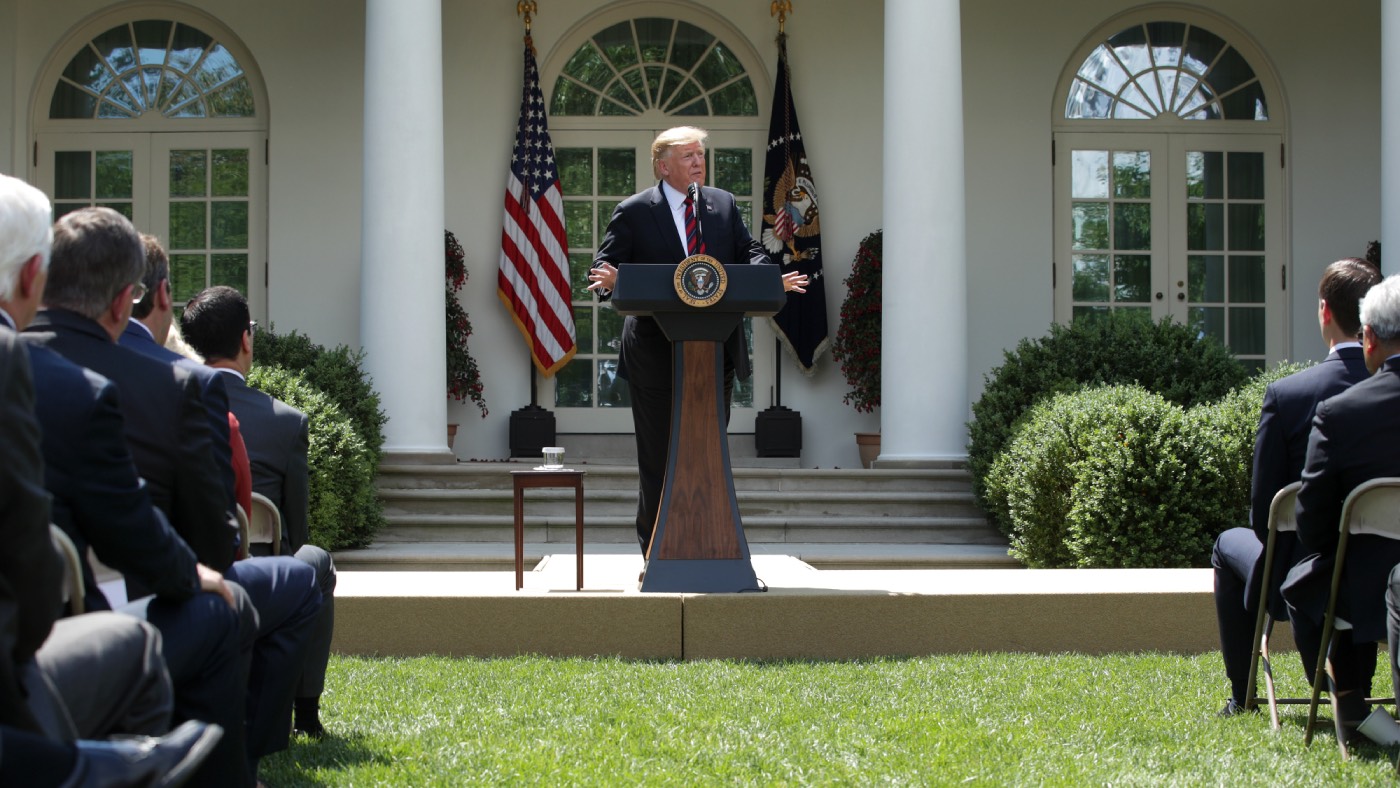Donald Trump announces ‘merit-based’ immigration policy plan
Democrat opponents say president's proposals are ‘dead on arrival’

A free daily email with the biggest news stories of the day – and the best features from TheWeek.com
You are now subscribed
Your newsletter sign-up was successful
Donald Trump has unveiled plans for a new US immigration system designed to favour younger, better-educated, English-speaking workers.
Announcing the plan, the US president said he wants to move away from the current approach that favours applicants with family ties to the US. He also pledged that border security would be tightened and a stricter line taken on asylum seekers.
He boasted that his proposals would make US immigration “the envy of the modern world”.
The Week
Escape your echo chamber. Get the facts behind the news, plus analysis from multiple perspectives.

Sign up for The Week's Free Newsletters
From our morning news briefing to a weekly Good News Newsletter, get the best of The Week delivered directly to your inbox.
From our morning news briefing to a weekly Good News Newsletter, get the best of The Week delivered directly to your inbox.
However, The Guardian reports that “before the US President even stepped up to the lectern in the White House Rose Garden” opponents had “declared the sweeping reforms dead on arrival’”.
The Washington Post said Trump’s announcement “drew a cool reception” and CNN said the plan “faces an uphill battle for consensus even among the Republican Party's own ranks”.
CBS News said Democrats “would not support legislation that does not include a pathway to citizenship”.
The new policy is the outcome of months of talks between Trump’s senior adviser Jared Kushner and several conservative groups.
A free daily email with the biggest news stories of the day – and the best features from TheWeek.com
Trump says his proposals will use “an easy-to-navigate, point-based selection system” to determine eligibility.
“You will get more points for being a younger worker, meaning you will contribute more to our social safety net. You will get more points for having a valuable skill, an offer of employment, an advanced education or a plan to create jobs,” he said at the lectern.
The president said his plan wouldn't change the total number of green cards offered annually but would increase the proportion allocated to skilled workers.
“We want immigrants coming in. We cherish the open door that we want to create for our country,” he said. “But a big proportion of those immigrants must come in through merit and skill.”
Opposition to the plan is already strong. The Democratic speaker of the House of Representatives, Nancy Pelosi, described it as “condescending” and dismissed Trump’s concept of “merit,” saying: "it’s non-merit - it means merit in the eyes of Donald Trump”.
Trump’s plans would have to be approved by Congress where Democrats currently control the lower house. “This dead-on-arrival plan is not a remotely serious proposal," said Pelosi.
Amnesty International described the reform as “an outrageous attempt to shut doors to everyone but the most wealthy and privileged individuals, circumventing human rights and legal obligations toward asylum-seekers”.
Australia and Canada both already use point-based systems to determine if someone qualifies to enter the country as a skilled worker.
-
 The EU’s war on fast fashion
The EU’s war on fast fashionIn the Spotlight Bloc launches investigation into Shein over sale of weapons and ‘childlike’ sex dolls, alongside efforts to tax e-commerce giants and combat textile waste
-
 How to Get to Heaven from Belfast: a ‘highly entertaining ride’
How to Get to Heaven from Belfast: a ‘highly entertaining ride’The Week Recommends Mystery-comedy from the creator of Derry Girls should be ‘your new binge-watch’
-
 The 8 best TV shows of the 1960s
The 8 best TV shows of the 1960sThe standout shows of this decade take viewers from outer space to the Wild West
-
 Will increasing tensions with Iran boil over into war?
Will increasing tensions with Iran boil over into war?Today’s Big Question President Donald Trump has recently been threatening the country
-
 Corruption: The spy sheikh and the president
Corruption: The spy sheikh and the presidentFeature Trump is at the center of another scandal
-
 Rubio boosts Orbán ahead of Hungary election
Rubio boosts Orbán ahead of Hungary electionSpeed Read Far-right nationalist Prime Minister Viktor Orbán is facing a tough re-election fight after many years in power
-
 Switzerland could vote to cap its population
Switzerland could vote to cap its populationUnder the Radar Swiss People’s Party proposes referendum on radical anti-immigration measure to limit residents to 10 million
-
 Greenland’s capital becomes ground zero for the country’s diplomatic straits
Greenland’s capital becomes ground zero for the country’s diplomatic straitsIN THE SPOTLIGHT A flurry of new consular activity in Nuuk shows how important Greenland has become to Europeans’ anxiety about American imperialism
-
 Epstein files topple law CEO, roil UK government
Epstein files topple law CEO, roil UK governmentSpeed Read Peter Mandelson, Britain’s former ambassador to the US, is caught up in the scandal
-
 Iran and US prepare to meet after skirmishes
Iran and US prepare to meet after skirmishesSpeed Read The incident comes amid heightened tensions in the Middle East
-
 Which way will Trump go on Iran?
Which way will Trump go on Iran?Today’s Big Question Diplomatic talks set to be held in Turkey on Friday, but failure to reach an agreement could have ‘terrible’ global ramifications